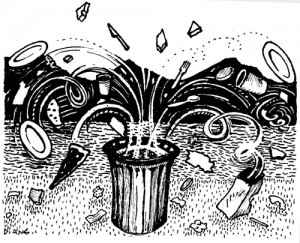
The Stranger in a Garbage Can, Illustration by Diane Wood
Jean and I were walking at Spanish Banks one fine morning with the sea sighing softly and the mountains watching us like old friends. Down the path was a garbage can, one of many used to collect the left-overs from numerous picnics.
As we approached the garbage can, a paper plate came flying out of it and rolled on the grass. We stopped in surprise, and saw another paper plate sail into the air, do a graceful loop, and land a few feet from the container.
“Someone is binning this morning,” I said. “He’s looking for a treasure where others see only trash.”
“He’s trying to make some money so he won’t starve,” Jean said, “and he must be very small to fit in that garbage can.”
A styrofoam cup flew out of the container, followed by a small paper bag.
“Maybe he’s a child who got left behind after a picnic,” I said.
“Maybe,” Jean replied. We were about twenty feet from the garbage can, and we stopped to consider the situation.
“A small bear could be in there,” Jean said.
“Bears don’t come to Spanish Banks,” I replied.
“Yes they do,” Jean said. “I heard that a bear tried to register in the Humanities 101 course at the University of British Columbia.”
Another paper plate flew out of the garbage can, along with a plastic fork and half a hamburger.
“Maybe he’s a coyote,” I said. “Coyotes live all over Vancouver.”
“I think coyotes would push the garbage can over,” Jean said.
Another paper cup, a paper towel, and a baby’s toy rattle shot over the edge of the container.
“A raccoon! That’s it. There’s a raccoon in that garbage can,” I exclaimed.
“Good guess,” Jean said. “Let’s be careful because raccoons can be quite fierce.”
We had moved closer to the garbage can, and we could hear something moving around inside it. That noise had our full attention, and we were ready to back off should the creature in the can prove to be dangerous. A slice of pizza erupted out of the garbage can. Then silence. We waited in this ominous silence with a mixture of fear and curiosity.
Slowly a black, feathered head, with black beak and eyes dark as midnight, appeared above the rim of the garbage can. “A crow,” Jean said in surprise.
“The mother of all binners,” I said.
The crow hopped up on the garbage can rim, and eyed us defiantly. “He looks like a general defending his territory,” Jean whispered.
“He sees us as a nuisance, not as a threat,” I said.
The crow dropped to the ground. He strutted among the delicacies he had rescued like a king among his treasures. He took his time. He was completely aware of where he was, and where we were.
“Black-robed priest,” Jean said.
“Or black-robed gangster,” I added.
“They stick together. They support each other,” Jean said.
“They do,” I agreed. “They have much to teach us about survival.”
The crow picked up a chunk of hamburger bun, gave us a dismissive look, and flew away. We were left behind, at Spanish Banks, beside the garbage can.
“If we could see crows as crows really are,” Jean said.
“That could take a lifetime,” I said.